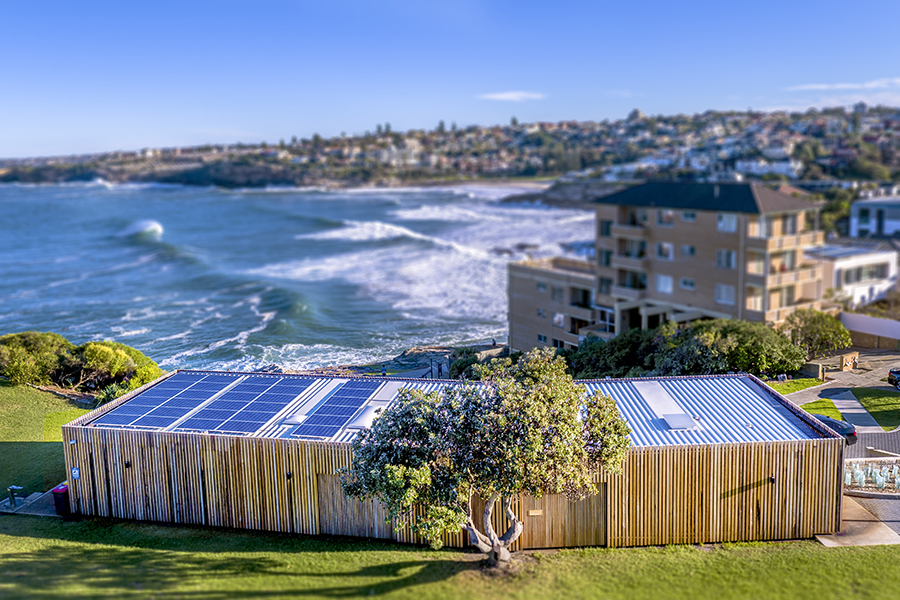Go solar
Electricity use is the largest contributor (approximately 60%) of community greenhouse gas emissions in Waverley. By installing solar power on your home or businesses, you can enjoy the benefits of renewable energy, such as lower energy bills while reducing community greenhouse gas emissions.
The amount of solar in Waverley has increased by 400% over the last 5 years to 2024. The uptake of solar is driven by three key factors:
- The NSW State Environmental Planning Policy (Sustainable Buildings) includes new standards effective from 1 October 2023 which apply in Waverley Council. These require new builds (and substantial renovations) to meet stricter thermal performance (heating/cooling) and emissions reduction targets, so installing solar is an effective way to help meet these.
- There are federal government incentives to install solar, which can reduce the upfront cost by thousands of dollars. The NSW Government Peak Demand Reduction Scheme (PDRS) incentivises residential battery storage installation and connecting to a Virtual Power Plant.
- Customers see an obvious household energy saving ongoing, which is attractive as the cost of fossil fuel generated power rises.
However, there are still 86% of single dwellings, and 98% of strata buildings and businesses in Waverley without on-site solar. Waverley Council is committed to supporting residents go solar via the resources below.
If solar isn’t feasible for you, switching to renewable mains power and increasing the energy efficiency of your home or business is still very valuable.
Solar on a home or business
If you own a property with a roof suitable for solar panels, the best place to start is the website for the Federal Government’s Small-scale Renewable Energy Scheme for either rooftop solar or solar hot water.
Adhering to this scheme ensures you can access any applicable discounts, but also connects you with authorised installers who sell approved panels. Be wary responding to unsolicited offers for solar panel installations.
The NSW Government rebate scheme for solar panels has closed, but the state has published valuable guidance online. NSW Fair Trading also provide valuable advice on how to ensure your installation is successful.
For an introduction to rooftop solar, watch the Installing Rooftop Solar in the Eastern Suburbs webinar.
Are you a community organisation? You can access a free solar feasibility study from Solar My Suburb including guidance throughout the procurement process. |

Solar on an apartment
The installation of solar panels on strata apartment buildings is encouraged and Council has already assisted multiple local properties go solar.
There are three common applications of solar in apartments:
- Common area solar only: suited to larger buildings with smaller roof spaces. The solar will reduce the common area electricity costs paid by the body corporate.
- Individual solar for individual apartments: this involves each apartment owner paying for the installation of their own system where they receive the full benefit of the solar. This model is best suited for townhouses, villas, or small low rise apartment blocks.
- Shared solar for individual apartments and common areas: this option involves one large solar system generating power for apartments and common areas, distributed by a solar sharing device.
The installation of solar typically is approved via an Annual General Meeting of the residents and requires bylaws for it to proceed (templates are available). In 2021, the NSW Government amended legislation so that only 50% of owners need to support the installation of solar for it to proceed.
Waverley has a number of other programs that assist strata buildings to navigate their way to a successful solar installation:
- Building Futures provides free assistance to residential strata buildings (25+ units) to save energy and water, including matched funding of up to $1000. This includes a basic solar feasibility study.
- A Strata Solar Survey template to gauge residents interest in solar and additional information to strata buildings progress their solar installation. Contact the Environment team for the free template and resources.
- A list of energy consultants who service the area and provide strata advice is available.
For more detailed help about installing solar on apartments, visit the Yarra Energy Foundation’s Guide to Solar for Apartments.
Solar my Suburb
Solar my Suburb is an initiative jointly run by Randwick, Waverley and Woollahra Councils.
The service provides free independent advice and support to help club and community organisations go solar, from start to finish. The entire process usually takes between 6-12 months.
For more information, visit solarmysuburb.org.au.
Solar and heritage
The Solar Panels and Heritage Guidelines provide information on how to get the correct approval to install solar panels in Heritage Conservation Areas and Heritage Listed Properties in a way that protects Waverley’s character.
To explore Waverley’s heritage and how it relates to local development, see Heritage.
Watch: Installing Rooftop Solar in the Eastern Suburbs |
Quick links
Related forms/documents
- Guide to Solar for Apartments by Yarra Energy Foundation (VIC)
- Strata Energy Service Consultants in Waverley
- Solar Panels and Heritage Guidelines


